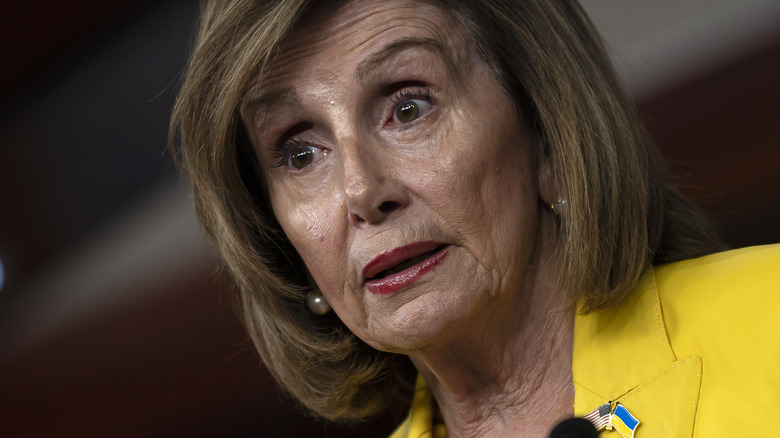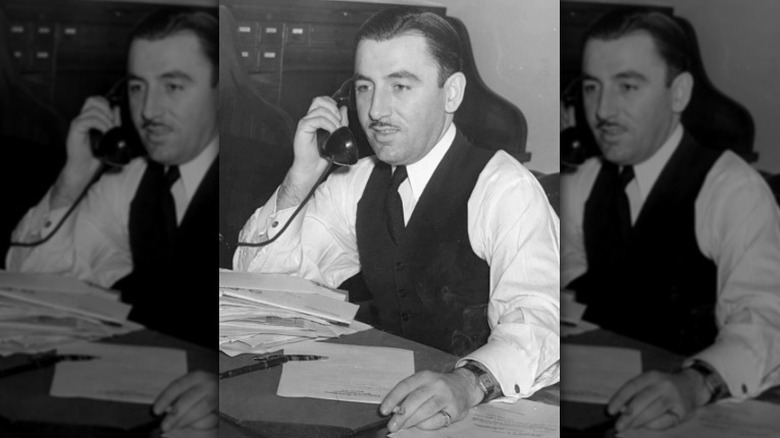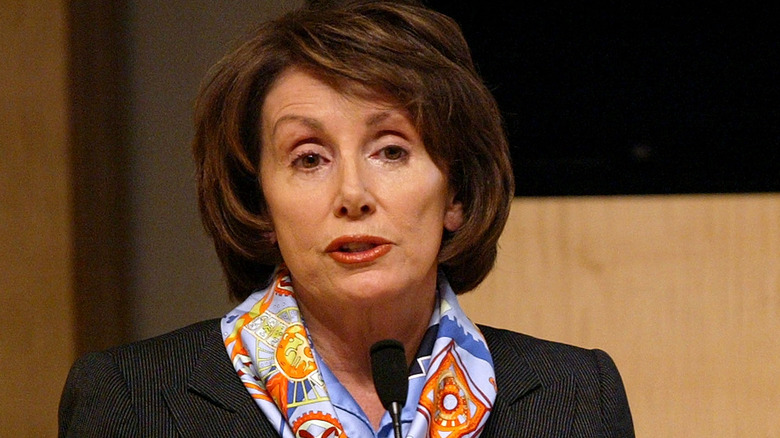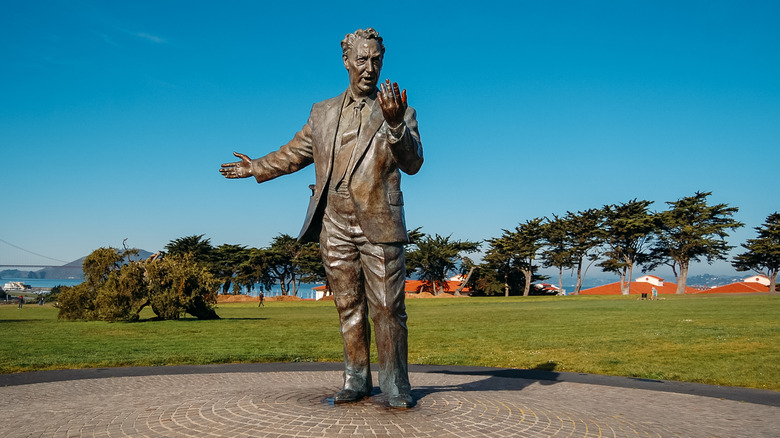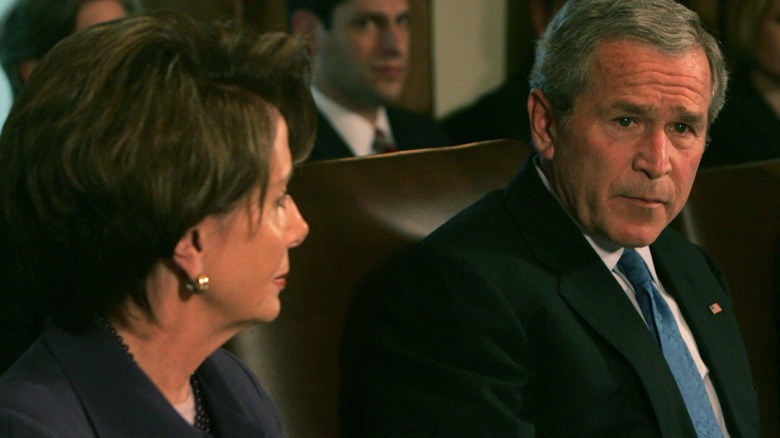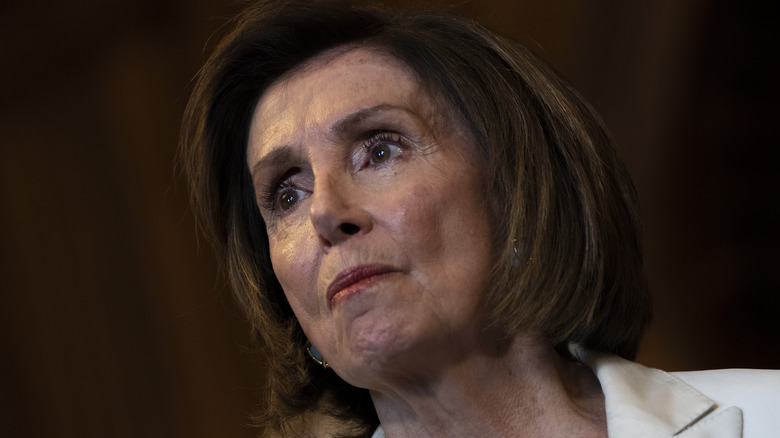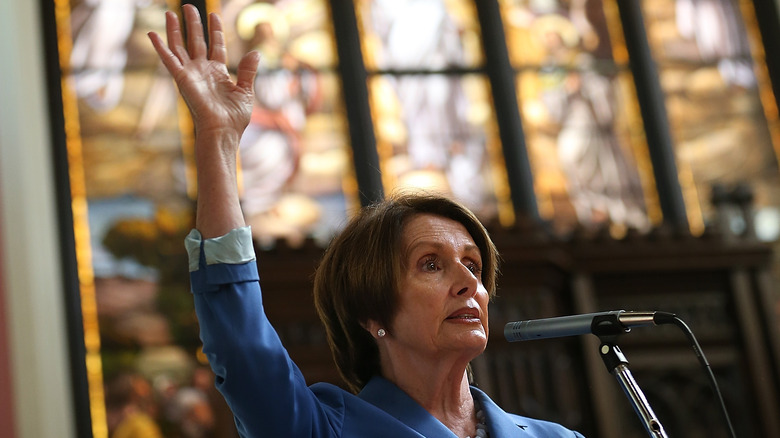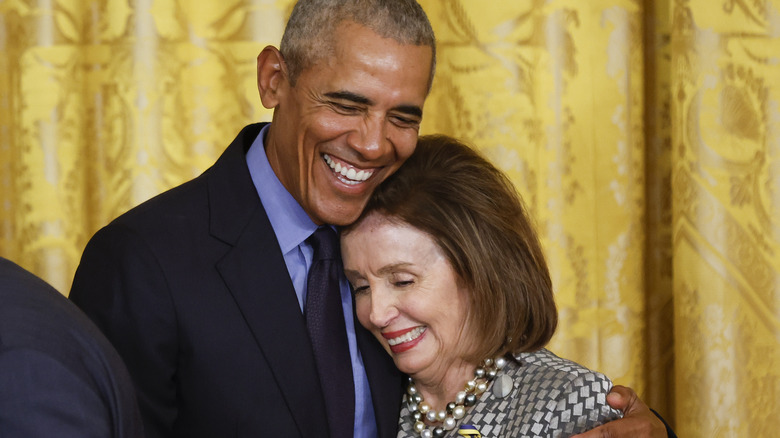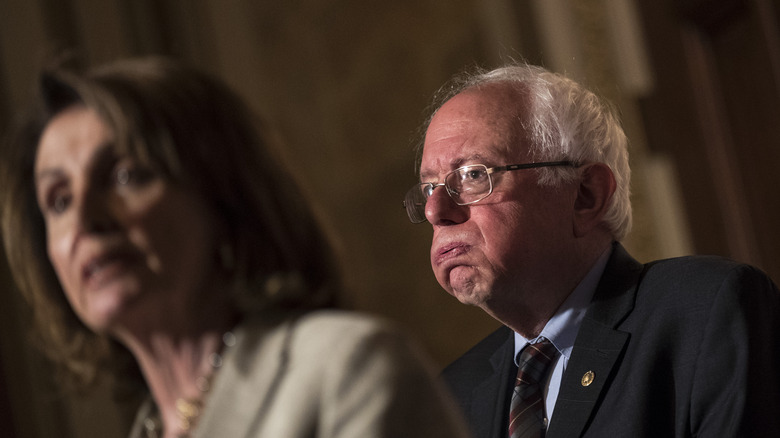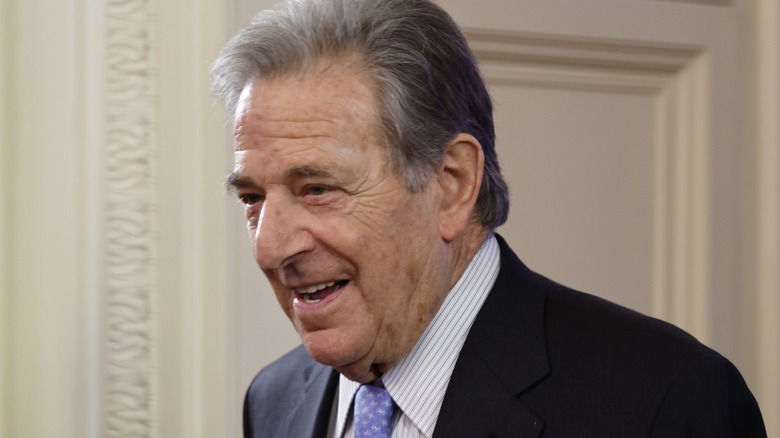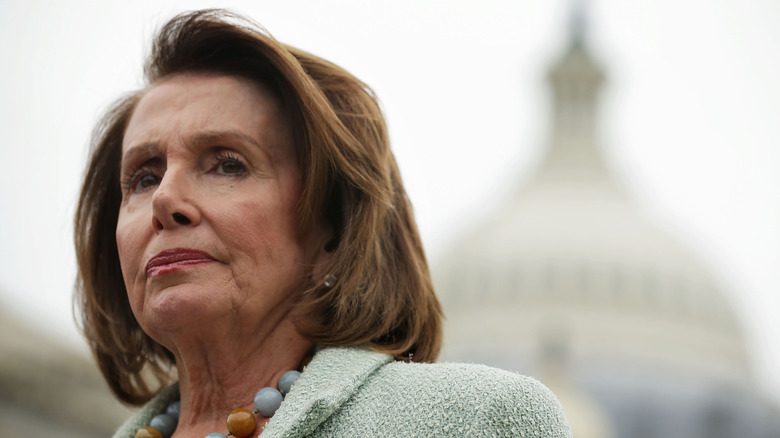Things Most People Don't Realize About Nancy Pelosi
On January 4, 2007, Nancy Pelosi made American history. This was the day, per History.com, that she became the first — and, as of July 2022, the only woman to be elected Speaker of the House of Representatives. It was an occasion even her political rivals saw as worth celebrating at the time. When President George W. Bush delivered his State of the Union address later that year, he opened with: "Tonight, I have a high privilege and distinct honor of my own — as the first president to begin the State of the Union message with these words: Madam Speaker" (per an archive of the Bush White House).
The warm reception didn't last long, at least on the Republican side of the aisle. In the years since Pelosi first became speaker, and in her time as minority leader from 2011 and 2019, she has been routinely attacked by conservatives for being too left-wing and too detached from ordinary Americans. Moderates in her own party have voiced similar complaints, while in recent years, more progressive members of the Democratic caucus have found her too cautious and compromising. As her tenure as Democratic leader in the House has gone on, she has begun seeing challenges to her position (per Britannica).
Despite the controversy, Pelosi has been an extraordinarily effective fundraiser for Democrats. She has also shepherded key pieces of legislation to the desks of Presidents Barack Obama and Joe Biden.
She's not the only politician in the family
Despite America's rejection of monarchy and aristocracy at its founding, political dynasties have developed. The Adamses, the Kennedys, and the Roosevelts, to name but a few, have produced multiple presidents and members of Congress. Nancy Pelosi's family hasn't seen anyone reach heights comparable to Speaker of the House, but they have their own political legacy.
Pelosi is the only daughter of Thomas "Big Tommy" D'Alesandro Jr, a prominent Italian American in Baltimore politics in the first half of the 20th century, according to The Washington Post. As a congressman from Maryland during World War II, D'Alesandro was a firm supporter of Franklin Roosevelt but broke with him over Jewish refugees; D'Alesandro was part of a group that urged the administration to do more to rescue Jews from Hitler's forces (per the The Jerusalem Post). After serving in Congress, he went on to become a three-time mayor of Baltimore, setting an example for his daughter in how to work in politics.
Pelosi's political career didn't begin until she relocated to San Francisco, but her father's Maryland power base was kept within the family. His oldest child, Thomas "Young Tommy" D'Alesandro III, served on the Baltimore City Council and as mayor from 1967 to 1971. According to The Baltimore Sun, the strikes and riots of 1968 exhausted him, and he declined to seek a second term.
She had a long tenure in San Francisco politics
According to The Washington Post, Nancy Pelosi married her college sweetheart, Paul, in 1963. By late 1970, they had five children. So many children in so short a span of time required her to become an expert organizer and disciplinarian, and Pelosi has credited her experience as a mother with shaping her political career. But she was relatively late in entering politics. Despite her father and brother being active in state and local government in their native Maryland, Pelosi wouldn't venture into that world until she and Paul moved to San Francisco in 1969 (per Britannica).
When Pelosi did start her political work, she was quick to make a reputation. Beginning as a volunteer for the local Democratic Party, she proved adept at fundraising. This was the base on which she built a long career in San Francisco and California politics. A timeline compiled by The Guardian has her as a California committeewoman for the Democratic National Party by 1976, a title she would hold for 20 years. WIthin that time, she also served as chair of the California State Democratic Party and the finance chairman of the party's senatorial campaign committee. In 1984, she was chair of the host committee for the DNC's convention, held in San Francisco (per Britannica).
She came up through the Burton machine
By the time Nancy Pelosi arrived in San Francisco, the city had shifted from Republican to firm Democratic control. This was thanks, in no small part, to the "Burton machine." According to the San Francisco Examiner, the "machine" was a pair of brothers, Phil and John Burton. Midwesterners originally, the Burtons moved to California at a young age and grew up to be active in local government. Phil was an assemblyman by 1956, while John became a lawyer. Both were heavy drinkers and rough speakers, but their charisma and political acumen served them well.
When San Francisco's congressman Jack Shelley was pressured into campaigning for mayor in the 1960s, Phil jumped at the chance to claim his seat in the House of Representatives. Despite not liking Shelley, the Burtons successfully campaigned on his behalf, paving the way for Phil to go to Congress and for John to take his brother's seat in the state Assembly. The brothers became power brokers in San Francisco, with their friends and allies elevated to mayorship or the Assembly. Phil fell short of becoming Speaker of the House in 1976 by a single vote.
Per Britannica, Phil and his wife Sala became friends and patrons of Pelosi as she rose through California politics. When Phil died in 1983, Sala took his place in Congress, but she herself was in ill health. Aware that she was dying, she encouraged Pelosi to run in the special election that would replace Sala in 1987.
She blocked impeachment of George W. Bush
Per The Guardian, Nancy Pelosi became leader of the Democrats in the House of Representatives in 2002 and speaker in 2007. In both roles, she necessarily had significant dealings with President George W. Bush. Beyond their expected differences on political matters, Pelosi found Bush an ineffective leader at key moments of the financial crisis and was bitterly opposed to the Iraq War before that. Intelligence failures in the lead-up to the war eroded her trust in the administration. "There aren't enough words to describe how outraged [Pelosi] was with George Bush and his policies," spokesman Jim Manley told Vox.
Despite her personal animosity toward Bush, Pelosi was prepared to work with him on legislation. At times, they had a more productive working relationship than Bush had with Congressional Republicans. And when some Democrats began agitating to impeach Bush after retaking the majority in 2006, Pelosi showed no enthusiasm. Having seen the disruption caused by Republicans' impeachment of Bill Clinton, she saw nothing to be gained in a political attack on Bush that was guaranteed to fail in the Senate. She repeatedly told her members and the press, "Impeachment is off the table" (per AP).
Among those who professed disappointment with Pelosi's decision was Donald Trump, who told CNN in 2008 that he was impressed with the speaker but felt Bush's "lies" over Iraq deserved impeachment. His tune changed significantly when he was president. Yet Pelosi exercised similar caution in impeaching Trump, relenting only after Robert Mueller's investigation.
What did she know about waterboarding?
Nancy Pelosi was consistently and vehemently opposed to the Iraq War. She was among the members of Congress who voted against the joint resolution that began it in 2002 (per ThoughtCo) and called it a "failure" in 2008 (per Politico). One of the strongest points of contention for Democrats about the Iraq War was the revelation that the CIA used torture in an effort to extract information from suspected terrorists under the euphemism of "enhanced interrogation techniques." The torture program drew international condemnation when it became public knowledge, and Pelosi was among those who denounced it. But just when she knew about the CIA's interrogations and when remains a matter of contention.
In 2007, The Washington Post reported that a small bipartisan group of congressional leaders, including Pelosi, was briefed by the CIA in 2002 on interrogation techniques being used against terror suspects, and that there was no objection raised by any lawmakers. The CIA even claimed that they were encouraged to pursue the program. In 2009, declassified records seemed to support the story (per The Guardian). Pelosi argued that the practice of waterboarding was raised as a hypothetical that the Bush administration believed was legal, but that Congress was not told it was being used. She would go on to accuse the CIA of lying (per NPR). Then-CIA director Leon Panetta seemed to support Pelosi's charge (per the Wall Street Journal), but other officials still objected.
Her Catholicism moved her to support LGBT rights
Like many Catholic Democrats, Nancy Pelosi has encountered tensions throughout her career between her faith and her political platform. This has been most visible on the issue of abortion. Pelosi's support for a woman's right to an abortion, and her public support for codifying the Roe v. Wade ruling, led the archbishop of San Francisco to deny her Holy Communion in his archdiocese in 2022. Pelosi received Communion at a papal Mass in Rome later that year, somewhat undermining the impact of the archbishop's ban (per NPR).
Catholic teaching also runs contrary to Pelosi's stance on the LGBT community. She has been among the most consistent members of Congress in supporting gay rights, dating back to 1996 when she voted against the Defense of Marriage Act (per the House's vote tally). The LGBT magazine the Washington Blade detailed her opposition to a Federal Marriage Amendment, her support for the Hate Crimes Prevention Act of 2009 and the repeal of "Don't Ask, Don't Tell" in 2010, and her promotion of the as-yet unpassed Equality Act to broaden the Civil Rights Act's scope to include LGBT communities.
In 2012, Pelosi addressed reporters in the wake of President Barack Obama's unprecedented endorsement of marriage equality. She defended the president's declaration and deflected questions about the political price for her members. She also cited her Catholic faith as motivating her position. "My religion compels me ... to be against discrimination of any kind," she said (per The Hill).
Her covert support for Obama in the 2008 election
During the Democratic primary elections in 2008, Nancy Pelosi was officially neutral. As leader of the Democrats in the House of Representatives, she would be required to stand behind whoever the party nominated. But Steve Kornacki of the Observer insisted: "Whatever her official posture, Nancy Pelosi is not neutral in the Democratic primary." Kornacki felt her statements and actions pointed to a clear favorite: Barack Obama.
Specifically, Kornacki pointed to Pelosi's warning on ABC about superdelegates. At that point in the primaries, Obama had gathered a decisive lead on Hillary Clinton in pledged delegates whose support was determined by voters. The ability of superdelegates — party power brokers and officeholders — to disregard the popular vote and change their minds at the national convention, was the only way that Clinton could have defeated Obama in 2008 (per The Guardian). Without naming Clinton, Pelosi unambiguously opposed subverting the popular will through such a strategy.
The Iraq War may have been another factor for Pelosi, per Kornacki. She was the highest-ranking member of Congress on the Democratic side to oppose the war and had to endure large swaths of her party lining up behind the Bush administration rather than heed her example. Clinton was among the Democrats who voted for the war, while Obama — not yet in the Senate at the time — spoke out against it.
Is she really that left-wing?
It's one of the most common attacks thrown by Republicans against any Democrat. Whether the word used is "liberal," "socialist," or even "communist," the charge is the same: This candidate is too far to the left for America. Such labels have frequently been applied to Nancy Pelosi. At times, she and her allies have even claimed them as a badge of honor, and in 1996 Pelosi told the San Francisco Chronicle that she does not consider herself a moderate. She received praise as a figure of the left in the mainstream press during the legislative battles fought in Congress during the first term of the Obama administration.
But Pelosi also once told reporters that she was mindful that the Speaker of the House must represent the full House (per AP). And as leader of congressional Democrats, she has had to manage a diverse caucus of avowed progressives, center-left liberals, centrists, and even some lingering "Blue Dog" conservatives. By necessity, navigating among these factions has required concessions in crafting legislation that regularly falls short of progressive aspirations.
Whether Pelosi herself is truly a figure of the left is sometimes questioned by those so aligned. Progressive writer Mehdi Hasan doesn't think she is, and criticized her lack of vocal support for the left wing of the Democratic party in The Intercept. And her biographer Molly Ball told Vox that she suspected Pelosi was more loyal to the Democratic Party as an institution than to policy matters.
Wine made her a fortune – and a headache
In 2005, Nancy Pelosi and her husband Paul received permission from Napa County to operate a winery on the vineyard they own, situated on the Napa River and purchased for over $2 million in the 1990s. Ten years later, according to the Los Angeles Times, the Pelosis had yet to finish construction, but the sale of grapes from their lands brought them thousands of dollars in annual income. The estate has been used by Pelosi to host political events and notable figures in California society, and its incomes contribute to her status as the 15th wealthiest member of Congress.
But the vineyard was also behind a minor embarrassment for the speaker in May 2022. Paul Pelosi was driving at night when he crashed a 2021 Porsche near their estate. Per CBS News, he was arrested, charged with drunk driving, and released on $5,000 bail. There were no injuries.
Pelosi was not in California when her husband had his crash. Per NPR, she was delivering a commencement speech at Brown University. When asked for a statement, her spokesman Drew Hammill said, "The Speaker will not be commenting on this private matter which occurred while she was on the East Coast."
Her stance on stocks rubs Democrats the wrong way
Nancy Pelosi's husband Paul is a venture capitalist. There's no law saying he can't be. But there is a perception that, because he is married to the Democratic leader in the House, Paul may have access to information that others don't when trading stocks. Multiple members of Congress — and their staffs — have violated the STOCK Act per CNBC, a law intended to keep lawmakers from acting on insider information when engaged in certain financial transactions, including the sale of stocks. Violations are rarely acknowledged, and "punishment" amounts to small fines.
Pelosi herself does not own stock, yet her husband's career would seem to be a conflict of interest. Yet when asked by Business Insider whether members of Congress — or their spouses — should be able to trade individual stocks, she was quick to say yes. "We are a free-market economy," was her logic. In the same conference, Pelosi denied knowledge of an Insider investigation into violations of the STOCK Act.
Pelosi's attitude attracted condemnation from the left and the right. Republican Senator Josh Hawley called for a ban on any member of Congress trading stock, while Democratic Senator Jon Ossoff proposed legislation to that end (via Insider). Progressive representative Alexandria Ocasio-Cortez voiced such sentiments even before Pelosi's remark (per New York Magazine). A stock-ban bill remains mired in Congress as of August 2022, with some Democrats insinuating that Pelosi is helping to stonewall any such legislation (per Insider).
